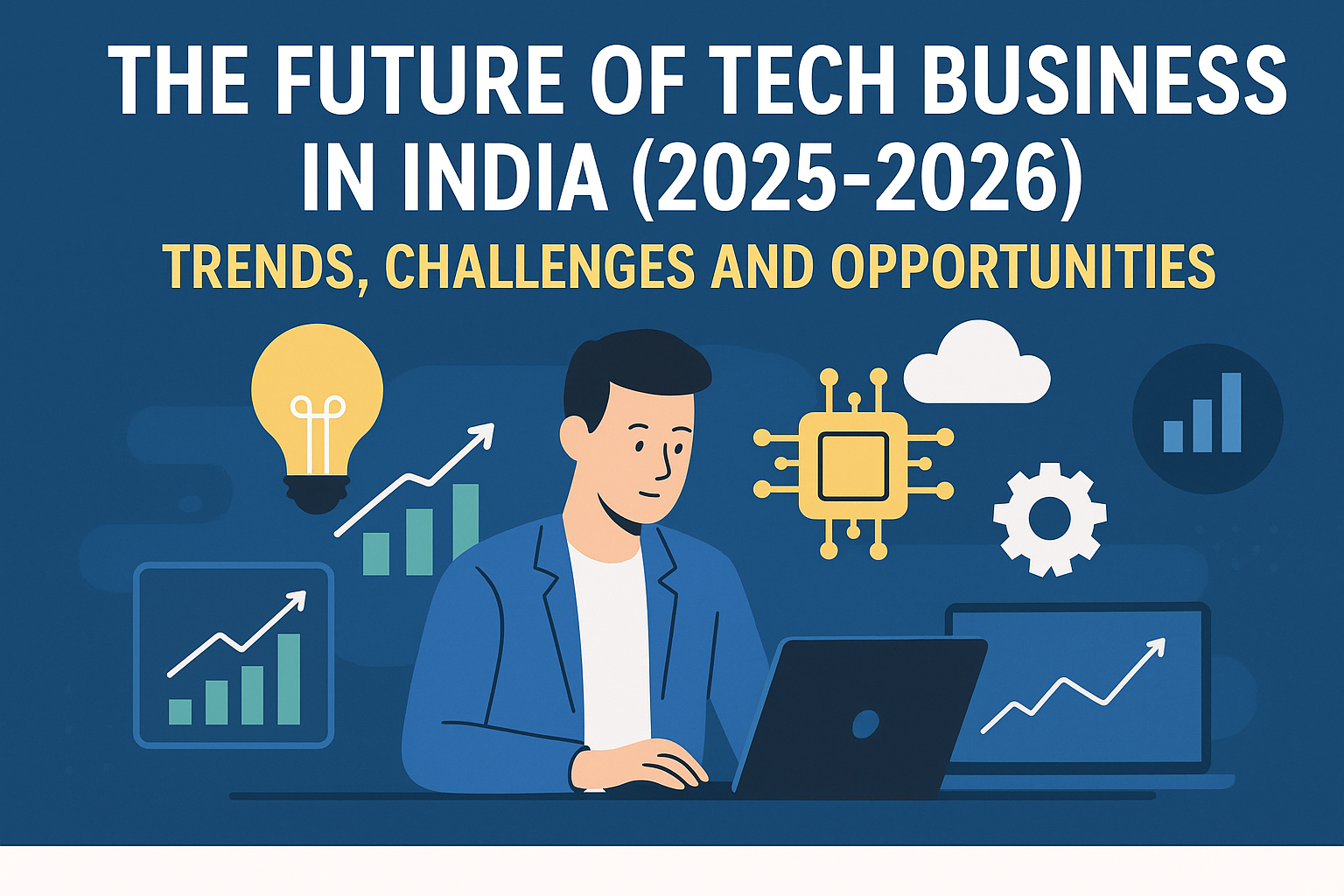The world of technology is changing faster than ever, and India has become one of the most exciting hubs for innovation, entrepreneurship, and digital growth. The next few years are going to reshape how small businesses, startups, and enterprises operate. Artificial intelligence, cloud computing, Internet of Things (IoT), and cybersecurity are not just buzzwords anymore — they are the foundation of every successful company.
In this article, we’ll explore how the Indian tech business landscape is evolving, which trends will dominate 2025–2026, what opportunities exist for startups and small businesses, and how you can use SEO and digital marketing to grow your own tech platform like BilalTech.online.
- Rise of AI Tools for Small Businesses in India
Artificial Intelligence (AI) is no longer a futuristic dream. In India, small businesses are increasingly using AI tools to save time, reduce costs, and improve customer experience. From content creation to chatbots, email marketing automation, and data analytics — AI is revolutionizing every field.
AI tools for small business in India such as ChatGPT, Jasper, Writesonic, and Notion AI are helping entrepreneurs run their operations more efficiently. Instead of hiring large teams, small firms can now use automation for customer support, social media posting, and even market research.
AI tools are also creating new job roles in India. Rather than replacing humans, they are enabling people to work smarter. Companies that adopt AI early will gain a massive advantage in terms of productivity and decision-making.
- The Growth of Cybersecurity for SMEs in India
With the rise of digital operations comes the threat of cyber attacks. Small and medium enterprises (SMEs) are especially vulnerable because they often lack proper data protection systems. Cybersecurity for SMEs in India is now a hot topic as the government pushes for better data privacy regulations.
Modern cybersecurity solutions such as zero-trust architecture, endpoint security, and identity access management are becoming essential. Even a small business should implement basic protection — two-factor authentication, SSL encryption, and employee awareness training.
In 2025 and beyond, cybersecurity will be one of the fastest-growing markets in India. Startups offering affordable cybersecurity services for SMEs will see strong growth and consistent demand.
- Cloud Computing and SaaS Adoption
Cloud computing has become the backbone of digital India. More startups are moving away from physical servers to scalable cloud platforms like AWS, Google Cloud, and DigitalOcean. This allows them to pay only for what they use, reduce infrastructure costs, and scale quickly.
SaaS (Software as a Service) has also opened new doors for Indian tech businesses. SaaS tools for Indian startups are affordable, easy to deploy, and perfect for remote work. Companies offering CRM, billing, HR, or data analytics through SaaS models are expanding fast.
In 2025-2026, expect to see more SaaS startups targeting niche problems like accounting for small retailers, AI-powered hiring tools, or digital invoice systems for freelancers. These markets are still open and have low competition.
- IoT Solutions for Agriculture and Industry
The Internet of Things (IoT) is transforming how we produce, monitor, and deliver goods. One of the biggest opportunities lies in IoT solutions for agriculture in India. Farmers can now track soil conditions, monitor crops, and control irrigation systems using IoT sensors connected via mobile apps.
In industries like logistics, manufacturing, and healthcare, IoT helps companies gather real-time data for smarter decision-making. Edge computing is further improving this by processing data locally instead of sending it to faraway servers, reducing delay and improving accuracy.
For startups, IoT remains a powerful business opportunity with relatively low competition in rural and industrial sectors.
- The Expansion of Remote Work Productivity Tools
Remote work is no longer temporary — it’s part of the new normal. After the pandemic, both startups and corporations in India are building hybrid models where employees work from different cities or even countries.
This shift has led to growing demand for remote work productivity tools in India such as Notion, ClickUp, Asana, and Trello. Startups that create tools to improve communication, time tracking, or data sharing for remote teams will find a large market.
Content creators, freelancers, and digital marketing agencies are also driving the growth of this segment. As gig work continues to expand, India will become one of the largest markets for remote collaboration technology.
- HealthTech and Telemedicine Revolution
Healthcare in India is being reshaped by technology. Telemedicine apps in India are helping patients consult doctors online without traveling long distances. Artificial Intelligence is being used to detect diseases earlier, predict health trends, and personalize treatment.
In rural areas, AI diagnostics apps and IoT-enabled devices are connecting people to doctors in real time. The telemedicine market is expected to grow at over 20% per year between 2025 and 2030. For tech entrepreneurs, building AI-based medical tools and digital healthcare platforms could be one of the most profitable moves in the coming years.
- D2C and E-Commerce Growth in Tier-2 and Tier-3 Cities
India’s next wave of digital growth will not come from Delhi or Mumbai — it will come from smaller cities. Tier-2 and Tier-3 India are embracing online shopping, mobile payments, and digital advertising faster than ever.
Direct-to-Consumer (D2C) startups are taking advantage of this boom. Local brands are using WhatsApp, Instagram, and affordable delivery services to reach millions of new customers. Building a tech business that supports D2C logistics, payments, or marketing tools can lead to long-term success.
- Opportunities for Indian Tech Entrepreneurs
The Indian tech ecosystem in 2025 offers countless opportunities:
- AI and Automation Startups: Build AI tools for small businesses, education, or marketing.
- IoT in Agriculture: Smart irrigation and crop analytics are still under-served.
- SaaS for Local SMEs: Simple cloud-based solutions for Indian accounting or HR management.
- Cybersecurity Consulting: Offer affordable protection plans for local enterprises.
- Remote Work Platforms: Create apps for freelancers, agencies, and hybrid teams.
- HealthTech Apps: Connect doctors and patients via mobile.
- D2C Enablement: Provide tech for delivery, warehousing, or digital marketing.
Each of these has high demand and low content saturation, meaning you can rank faster with SEO if you target the right long-tail keywords.
- Challenges Facing the Tech Business Industry
Even though the opportunities are massive, there are still real challenges to overcome:
Fast-changing technology: Trends evolve quickly, and old content becomes outdated.
Limited technical expertise: Many founders lack deep technical knowledge.
Funding gaps: Startups struggle with initial capital and marketing budgets.
Cyber threats: Data leaks and security flaws can destroy customer trust.
Global competition: International SaaS giants are entering India aggressively.
Solving these challenges requires a mix of innovation, localization, and consistent content strategy.
- SEO Strategy for Tech Websites Like BilalTech.online
Search Engine Optimization (SEO) is the best long-term way to build authority and organic traffic. Here’s a proven strategy for your website:
Keyword Optimization
Use long-tail keywords such as:
AI tools for small business India
cybersecurity for SMEs India
IoT solutions for agriculture India
remote work productivity tools India
telemedicine apps India
These are low-competition but high-intent search phrases. Include them naturally in headings, meta descriptions, and image alt tags.
Content Depth
Each article should be at least 2000–3000 words, with practical examples, statistics, and links to trusted sources.
Avoid thin or copied content — Google ranks only original, helpful writing.
Internal Linking
Link to related posts on your website. Example:
If you publish “AI Tools for Businesses,” link it to “Best SaaS Tools for Startups.”
External Linking
Link once or twice to credible external sites like Deloitte, Nasscom, or Indian tech journals. This builds authority.
Technical SEO
Make sure your site loads fast, is mobile-friendly, and uses HTTPS. Submit your sitemap to Google Search Console and fix broken links regularly.
Backlink Building
Guest post on Indian tech blogs, share insights on LinkedIn, and participate in relevant discussions on Reddit or Quora.
The more backlinks you earn, the higher your authority score grows.
Content Updates
Update every major post once every 6-12 months. Add new data, screenshots, or examples to keep the content fresh.
- Future Tech Predictions for India 2025-2030
The next five years will be dominated by five main forces:
- AI Everywhere: From customer support to logistics, automation will handle 70% of business operations.
- Digital India Expansion: Tier-3 cities will go fully digital, bringing millions of new users online.
- Sustainability Tech: Startups will focus on green energy, EV charging, and carbon-neutral logistics.
- Quantum Computing: Still early, but Indian universities are investing heavily in quantum research.
- Virtual Workspaces: Offices will become optional — the future belongs to virtual collaboration.
Entrepreneurs who understand these shifts early and create content around them will dominate search rankings.
- Practical Steps to Start Your Own Tech Blog or Business Site
- Pick a niche — AI, IoT, SaaS, or cybersecurity.
- Register your domain and hosting.
- Publish at least one article per week (2000+ words).
- Use free tools like Google Analytics and Search Console.
- Share your content on social media for backlinks.
- Focus on mobile-first design.
- Engage with your readers — reply to comments and questions.
- Optimize each post for one primary keyword and two related keywords.
- Use schema markup (FAQ or article type).
- Keep improving — SEO success is long-term.
- Conclusion
India’s tech business future is bright and full of opportunities. From AI tools for small businesses to IoT in agriculture and telemedicine, every sector is going digital. The key to success lies in choosing the right niche, understanding your audience, and staying consistent with SEO-friendly content.
BilalTech.online can quickly grow into a trusted source for business technology insights if it keeps publishing well-researched, original articles with real value. Focus on human-style writing, authentic examples, and low-competition keywords — and within months, your site can begin ranking for high-value tech topics.




